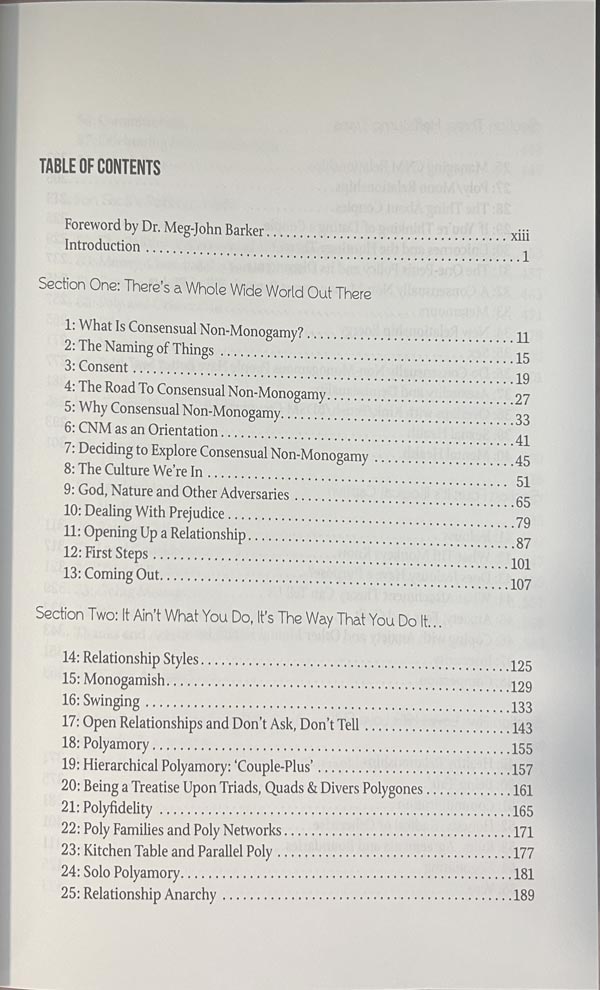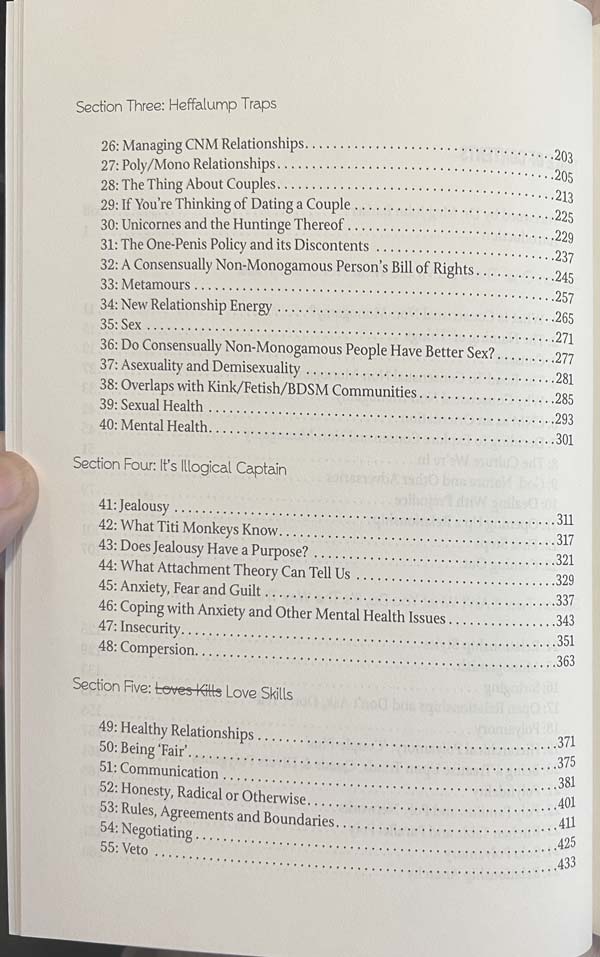When I co-authored the book on polyamory that carries my name, it caught fire—mostly, I think, because it was at the right place at the right time. It was published as polyamory reached a kind of historical inflection point. I’m still quite proud of that book, though I no longer recommend it as strongly, as my former partner and co-author has made changes without my approval.
But every book is a product of its time. The world now is not the world of a decade ago, and the book I co-authored—a deeply personal book written from the perspective of a very specific kind of polyamory at a specific moment in time—is no longer my #1 recommendation for folks who want to learn about consensually non-monogamous relationships.
A World Beyond Monogamy is the first genuinely journalistic book ever to be published on consensual non-monogamy. It’s also the first book of its kind with a global focus. It’s groundbreaking because it moves beyond the North American middle-class experience of polyamory that makes up the vast majority of poly books out there, including the one I co-authored.
For decades, white middle-class North Americans have enforced a kind of cultural hegemony over the world of organized ethical non-monogamy, largely because polyamory as a movement, and a codified way of doing relationships, emerged first in North America. At least outside of gay male spaces, which for many years have had their own particular flavor of non-monogamy, non-monogamous ideology—and certainly writing about non-monogamy—has tended toward a very white, very North American flavor, with everything that implies.
But as polyamory as a set of ideas about relationships has grown and spread, it has, in the past decades, started shaking off the North American hegemony, though naturally, like Britain in the closing days of its colonial empire, a lot of Americans haven’t kept up with the new reality.
So let’s talk about Jonathan’s book.
Jonathan spent a tremendous amount of time interviewing people all over the world for this book, which for the sake of brevity I will hereafter refer to as AWBM. This broad scope paints a picture of consensual non-monogamy as a far more varied and diverse thing than most other books on the subject.
AWBM is not a how-to. It doesn’t try to evangelize polyamory. If that’s what you’re looking for, this might not be the right book for you (though fear not, there are plenty of other books like that to choose from, including the one with my name on it).
If, on the other hand, you’re looking for a book that does a very deep dive into the world as it is, not as people want it to be, this is exactly the right book for you. Between its pages, you’ll find interviews with people from Sydney to Singapore, from India to Brazil, London to Seattle—all conducted by an experienced journalist with a long, solid, boots-on-the-ground career.
When you step outside the bubble and talk to people from a widely diverse range of backgrounds, it turns out that relationships are complicated, and non-monogamy is much, much larger than the North American scene it sprung from. Who knew?
So what makes this book so good that an author would recommend it over his own book? Two words: Journalistic rigor.
Jonathan brings years of journalistic experience to the table for this book (he’s written and broadcast, among others, for the BBC, The Guardian, Reuters, Newsweek and The Daily Telegraph).
I mean, I could say how the British humor—err, humour—and wit carry the book (and they do), how the writing informs the interviews (which it does), and how the book is one of the largest written thus far on the subject but flows so easily it doesn’t feel nearly as long as it is (which is true), but really, the secret sauce is years of professional experience. Jonathan is good at handing the microphone to the people he’s interviewing, centering their voices and their experiences rather than trying to slot their stories into his own narrative. This isn’t Jonathan Kent building a personal brand out of his research on non-monogamy, it’s Jonathan Kent getting out of the way of letting people share their lived experiences.
He also talks to academics and researchers who have studied consensual non-monogamy in an academic setting.
This book covers a lot of ground. It is without question the most comprehensive book ever written on consensual non-monogamy. I mean, check out the table of contents:
Let’s back up a step. In the book with my name on it, we refer to polyamory and swinging and such as ‘ethical non-monogamy.’ Jonathan uses ‘consensual non-monogamy,’ because ‘ethical’ is such a slippery word—one person’s ethics is another person’s “the Good Book says you will all burn in hellfire!”
Consent informs the entire book, from the foreword to the end. Chapter three, which is entirely about consent, sets out the focus of the book in detail. Everything he writes starts with, and ends with, consent. A lot of folks tend to think of consensual non-monogamy in tightly constrained ways; Jonathan shows that the idea of consensual non-monogamy applies to a more diverse range of non-monogamous perspectives than many folks might think.
If you’re looking for a book on consensual non-monogamy in all its forms, this is the one I recommend. (And hey, Christmas is coming; it’s a perfect gift for the non-monogamous folks on your list!)
In the spirit of full disclosure, links to this book on my site are affiliate links, of course. If you use my link, I make an Amazon affiliate commission. I also did the layout for the eBook, though I was not paid for it.




0 Comments